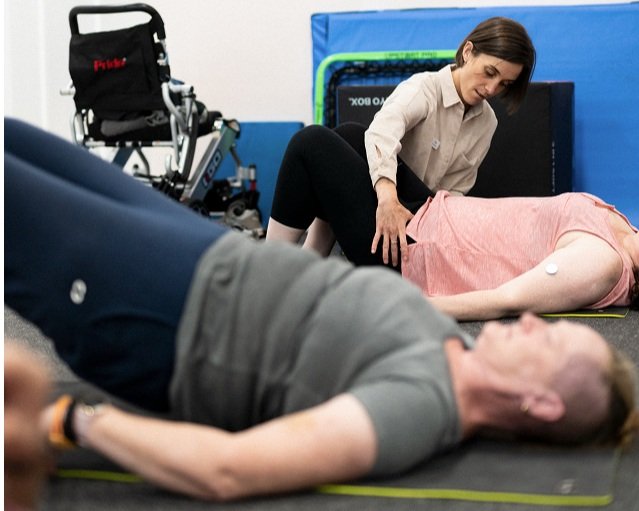Neuro Pilates and Multiple Sclerosis (MS) – a perfect match?
What is Pilates?
The coordination of the body, mind and spirit to improve overall fitness
Whole body exercises focusing on:
Strength and flexibility
A strong core (inner abdominals, pelvic floor, spinal and shoulder girdle stability)
Controlled breathing
Balanced and aligned body
Precise and controlled movements
Neuro Pilates is tailored mat or reformer-based Pilates exercises for people living with a neurological condition. This means that the traditional Pilates exercises have been adapted to better suit people with conditions like MS.
What is MS and what are the symptoms?
MS is a disease where the immune system attacks the central nervous system and disrupts signals to and from the brain. The location of these sites will determine the symptoms, as will the type of MS, which is why everyone with MS is so different.
Some of the more common MS symptoms include:
Numbness, tingling and other sensory changes
Weakness or tightness of muscles
Reduced motor control and tremors
Pain
Visual changes
Mood changes and memory problems
Fatigue
Bladder and bowel disfunction
Vertigo and Dizziness
Breathing problems
So why are Neuro-Pilates and MS such a good fit?
| MS Symptom | Neuro Pilates |
|---|---|
| Numbness, tingling and other sensory changes | Shoes and socks come off, the therapists’ hands go on, contact is made with lots of different surfaces, we move through a wide variety of positions and use heaps of props – all fantastic sensory input to strengthen the pathways feeding back to the brain. |
| Weakness or tightness of muscles | Targeted Neuro Pilates is an excellent way to strengthen the core, improve lumbopelvic and scapula (or shoulder stability) and strengthen weak arms and legs. There is lots of stretching and flexibility work in Pilates which is also fantastic for tight muscles or joints |
| Pain | Moving joints through their full range of movement and improving postural control and alignment is a great way to improve the pain and discomfort associated with MS. |
| Visual changes, Vertigo and Dizziness | As Neuro Physios we can incorporate vestibular physiotherapy skills into our Pilates program assisting with symptoms of visual disturbance, vertigo and dizziness. |
| Mood changes and memory problems Fatigue | Exercise makes you feel good and Pilates is no different. Doing exercise targeted to your individual functional level and that meets your physical needs will make you feel even better. Pacing your Pilates exercises and incorporating lots of stretching “rests” with help with symptoms of fatigue. You are guaranteed lots of laughs in our Neuro Pilates class! |
| Bladder and bowel disfunction | Neuro Pilates is an excellent way to incorporate pelvic floor exercises into your day which helps with bladder and bowel continence. Exercise in general is good for keeping things regular too! |
| Breathing problems | Controlled breathing is a big focus of Pilates and Neuro Pilates is a gentle way to exercise without putting a big strain on your cardiovascular system. |
| Reduced motor control and tremors | Pilates is all about movement quality and control including teaching your muscles when, and how to switch on. |
Not convinced? Let’s hear from Sheree who has been attending our weekly Neuro Pilates class for 8 months now;
“I was hesitant at first, I had not done anything like Pilates before but I thought it was worth a shot and I’m glad I did! Not only does Zoe create a fun and welcoming environment but the benefits of Neuro Pilates I am amazed with! I have noticed significant changes in my strength, range of moment and the frequency of vertigo reduced dramatically. I recommend Pilates to everyone now, especially my fellow MS warriors, you won’t regret it!”
How do I get started?
After an initial assessment with one of our physiotherapists or exercise physiologist there are a variety of ways you can do Neuro Pilates. We can teach you mat based exercises to do at home, come to your community-based classes to adapt the exercises to better suit you, see one of our TA’s 1:1 to do the program at home or in our clinic (which includes using our Pilates reformer) or you can attend our physiotherapy led Neuro Pilates group class.


